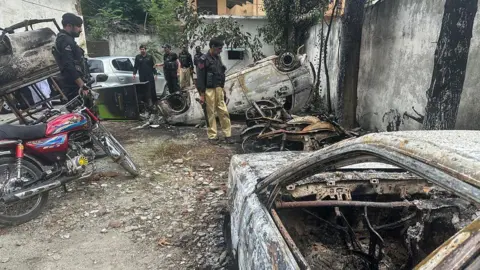Tourist accused of blasphemy killed by mob in Pakistan
 Getty Images
Getty ImagesA tourist has been dragged from a police station and killed by a mob in north-west Pakistan after being accused of blasphemy.
The police had been attempting to protect the man from the large group in the town of Madyan, a town in Swat district.
The mob had gathered after the man was accused of desecrating the Quran, Islam's holy book, on Thursday.
Lynchings are not uncommon after an accusation of blasphemy, which is punishable by death in Pakistan.
A Christian man was attacked last month after being accused of burning pages of the Quran, dying shortly afterwards.
Video of this latest incident has prompted outrage on social media in Pakistan. Footage shows the man's body being paraded through the streets and then set alight.
Police confirmed that the tourist had been "torched" and some 11 people were injured in the incident.
Malankand division's regional police chief Mohammad Ali Gandapur accused the local mosque of encouraging people to gather after police first rescued the man, who was reportedly visiting the Swat Valley - a popular destination in summer.
He told Reuters news agency that eight officers were among the injured.
Dr Zahidullah, police officer in the Swat region, told BBC Urdu police made a concerted effort to clear blocked roads to disperse the angry crowds of people on Thursday night.
Police say they have opened a case against hundreds of people involved in the incident - some as young as 13. Local authorities have since deployed additional security forces to the region.
According to BBC Urdu, hotels in the town had been full, but tourists were now scrambling to leave.
Religion-fuelled violence in Pakistan has risen since the country made blasphemy - made a crime under a 19th century law brought in by the British - punishable by death in the 1980s.
Even unfounded accusations can incite protests and mob violence against alleged perpetrators. Human rights critics have long argued that minorities are often the target of accusations.
Around 96% of Pakistan's population is Muslim. Other countries, including Iran, Brunei, and Mauritania also impose capital punishment for insulting religion.
